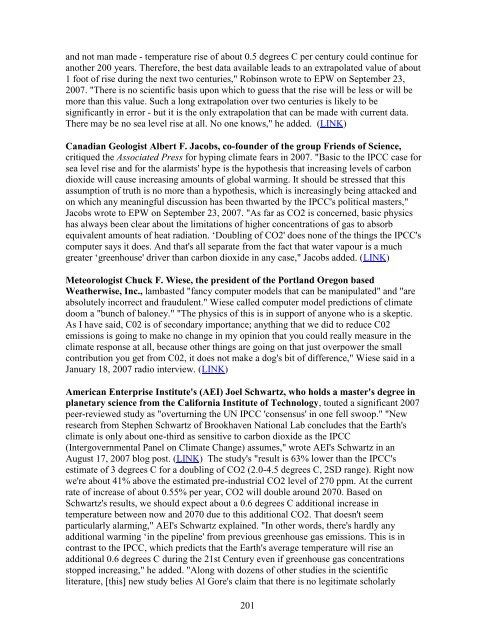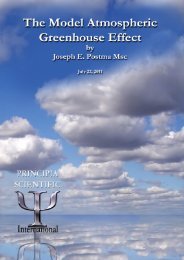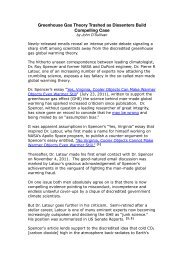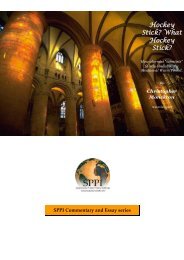Than 1000 International Scientists Dissent Over Man-Made Global ...
Than 1000 International Scientists Dissent Over Man-Made Global ...
Than 1000 International Scientists Dissent Over Man-Made Global ...
You also want an ePaper? Increase the reach of your titles
YUMPU automatically turns print PDFs into web optimized ePapers that Google loves.
and not man made - temperature rise of about 0.5 degrees C per century could continue for<br />
another 200 years. Therefore, the best data available leads to an extrapolated value of about<br />
1 foot of rise during the next two centuries," Robinson wrote to EPW on September 23,<br />
2007. "There is no scientific basis upon which to guess that the rise will be less or will be<br />
more than this value. Such a long extrapolation over two centuries is likely to be<br />
significantly in error - but it is the only extrapolation that can be made with current data.<br />
There may be no sea level rise at all. No one knows," he added. (LINK)<br />
Canadian Geologist Albert F. Jacobs, co-founder of the group Friends of Science,<br />
critiqued the Associated Press for hyping climate fears in 2007. "Basic to the IPCC case for<br />
sea level rise and for the alarmists' hype is the hypothesis that increasing levels of carbon<br />
dioxide will cause increasing amounts of global warming. It should be stressed that this<br />
assumption of truth is no more than a hypothesis, which is increasingly being attacked and<br />
on which any meaningful discussion has been thwarted by the IPCC's political masters,"<br />
Jacobs wrote to EPW on September 23, 2007. "As far as CO2 is concerned, basic physics<br />
has always been clear about the limitations of higher concentrations of gas to absorb<br />
equivalent amounts of heat radiation. ‗Doubling of CO2' does none of the things the IPCC's<br />
computer says it does. And that's all separate from the fact that water vapour is a much<br />
greater ‗greenhouse' driver than carbon dioxide in any case," Jacobs added. (LINK)<br />
Meteorologist Chuck F. Wiese, the president of the Portland Oregon based<br />
Weatherwise, Inc., lambasted "fancy computer models that can be manipulated" and "are<br />
absolutely incorrect and fraudulent." Wiese called computer model predictions of climate<br />
doom a "bunch of baloney." "The physics of this is in support of anyone who is a skeptic.<br />
As I have said, C02 is of secondary importance; anything that we did to reduce C02<br />
emissions is going to make no change in my opinion that you could really measure in the<br />
climate response at all, because other things are going on that just overpower the small<br />
contribution you get from C02, it does not make a dog's bit of difference," Wiese said in a<br />
January 18, 2007 radio interview. (LINK)<br />
American Enterprise Institute's (AEI) Joel Schwartz, who holds a master's degree in<br />
planetary science from the California Institute of Technology, touted a significant 2007<br />
peer-reviewed study as "overturning the UN IPCC 'consensus' in one fell swoop." "New<br />
research from Stephen Schwartz of Brookhaven National Lab concludes that the Earth's<br />
climate is only about one-third as sensitive to carbon dioxide as the IPCC<br />
(Intergovernmental Panel on Climate Change) assumes," wrote AEI's Schwartz in an<br />
August 17, 2007 blog post. (LINK) The study's "result is 63% lower than the IPCC's<br />
estimate of 3 degrees C for a doubling of CO2 (2.0-4.5 degrees C, 2SD range). Right now<br />
we're about 41% above the estimated pre-industrial CO2 level of 270 ppm. At the current<br />
rate of increase of about 0.55% per year, CO2 will double around 2070. Based on<br />
Schwartz's results, we should expect about a 0.6 degrees C additional increase in<br />
temperature between now and 2070 due to this additional CO2. That doesn't seem<br />
particularly alarming," AEI's Schwartz explained. "In other words, there's hardly any<br />
additional warming ‗in the pipeline' from previous greenhouse gas emissions. This is in<br />
contrast to the IPCC, which predicts that the Earth's average temperature will rise an<br />
additional 0.6 degrees C during the 21st Century even if greenhouse gas concentrations<br />
stopped increasing," he added. "Along with dozens of other studies in the scientific<br />
literature, [this] new study belies Al Gore's claim that there is no legitimate scholarly<br />
201





